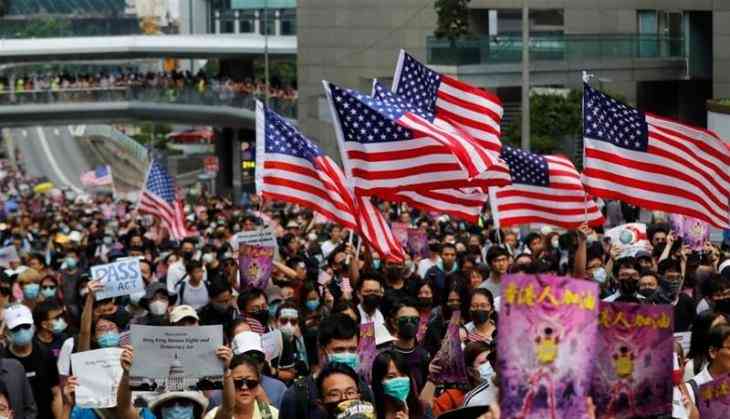
China on Thursday firmly opposed the United States signing of the Hong Kong Human Rights and Democracy Act into law, saying that the move is a "serious interference" in China's internal affairs.
China has time and again maintained that Hong Kong is its internal matter.
It is also in serious violation of international law and basic norms governing international relations. The Chinese government and the people firmly oppose such stark hegemonic acts, Xinhua news agency quoted Chinese Foreign Ministry statement.
It is a gross hegemonic move as it meddles with Beijing's domestic affairs, the statement said.
Despite stern warnings by China that it would retaliate with "countermeasures", US President Donald Trump on Wednesday (local time) signed a bill in support of the pro-democracy protestors in Hong Kong.
The Hong Kong Human Rights and Democracy Act, 2019, became a law, a week after the House and Senate passed it with veto-proof majorities, according to the US media reports.
The legislation slaps economic sanctions on individuals who commit human rights violations in Hong Kong and bars them from entering the US. It also mandates the State Department to furnish an annual report to lawmakers on whether Hong Kong remains "sufficiently autonomous" from China.
The legislation also aims at banning the export of certain munitions to the Hong Kong police.
"I signed these bills out of respect for President Xi, China, and the people of Hong Kong. They are being enacted in the hope that Leaders and Representatives of China and Hong Kong will be able to amicably settle their differences leading to long term peace and prosperity for all," Trump said in a statement.
The move is likely to impact the already strained ties between Washington and Beijing, casting a shadow over delicate talks between the two countries aimed at ending the trade war.
Last week, Trump had asserted that Hong Kong "would have been obliterated in 14 minutes" had he not used the pro-democracy protests in the semi-autonomous region as leverage in trade negotiations with China.
On Monday, China's foreign ministry summoned US Ambassador to Beijing Terry Branstad and lodged a protest against the passing of the bill saying it amounted to interference in an internal matter of China.
The development came after a landslide victory by Hong Kong's pan-democrats in district council elections that were seen as a strong rebuke of embattled leader Carrie Lam.
Large-scale protests, triggered by a now-withdrawn controversial extradition bill, have been ongoing in Hong Kong since early June, with the police detaining nearly 4,500 people so far.
Over 1,500 people have been hospitalised after sustaining wounds in clashes and over 400 police officers have been injured.
China has accused Western countries of instigating the pro-democracy unrest in the city.
(ANI)
Also Read: US to designate Mexican drug cartels as terror outfits


